2023-2024学年英语鲁教版(五四学制)八年级下册Unit 2 It’s a nice day, isn’t it?复习课件(共33张PPT)
文档属性
| 名称 | 2023-2024学年英语鲁教版(五四学制)八年级下册Unit 2 It’s a nice day, isn’t it?复习课件(共33张PPT) | 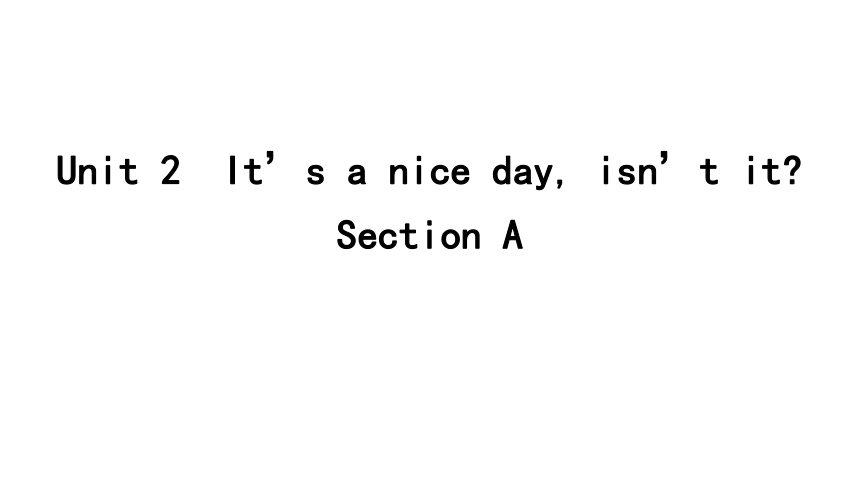 | |
| 格式 | pptx | ||
| 文件大小 | 174.6KB | ||
| 资源类型 | 教案 | ||
| 版本资源 | 鲁教版 | ||
| 科目 | 英语 | ||
| 更新时间 | 2024-07-06 10:34:59 | ||
图片预览

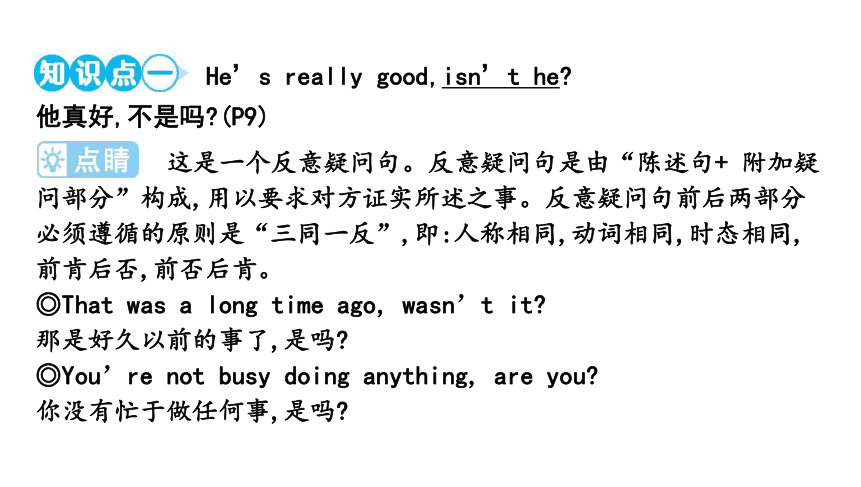
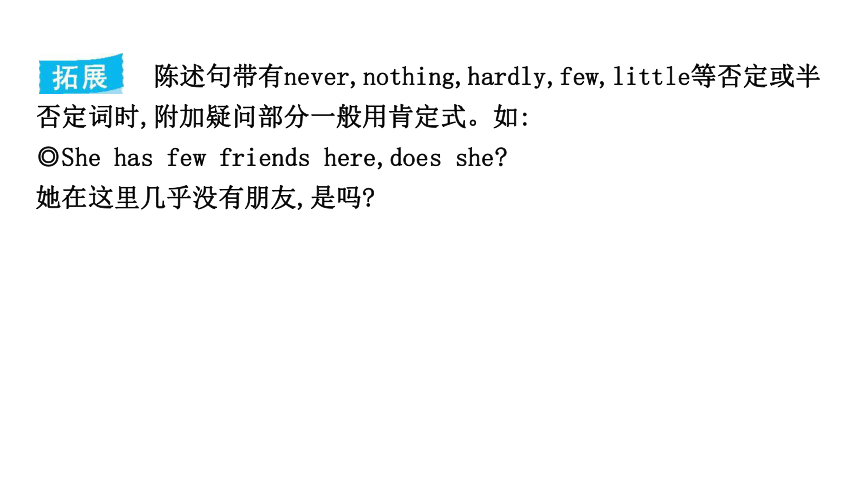
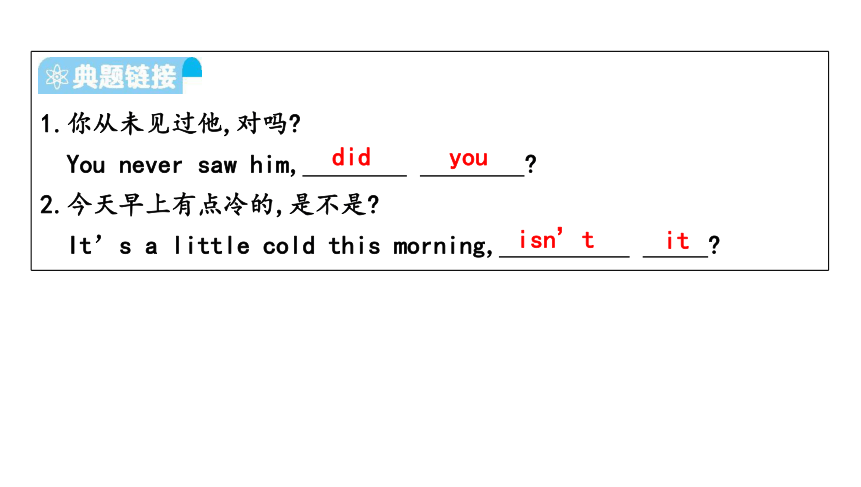
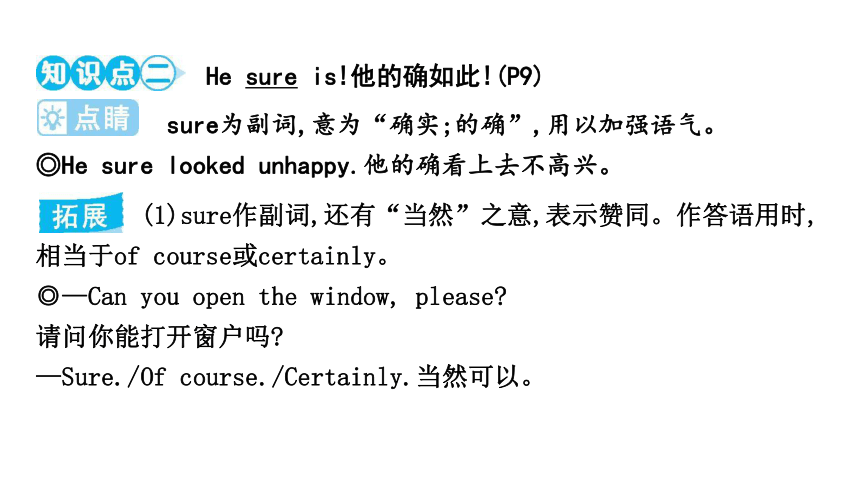
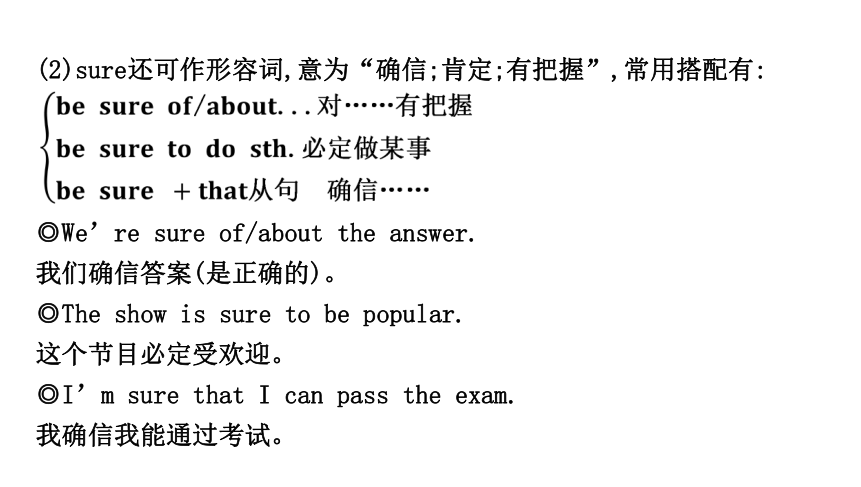
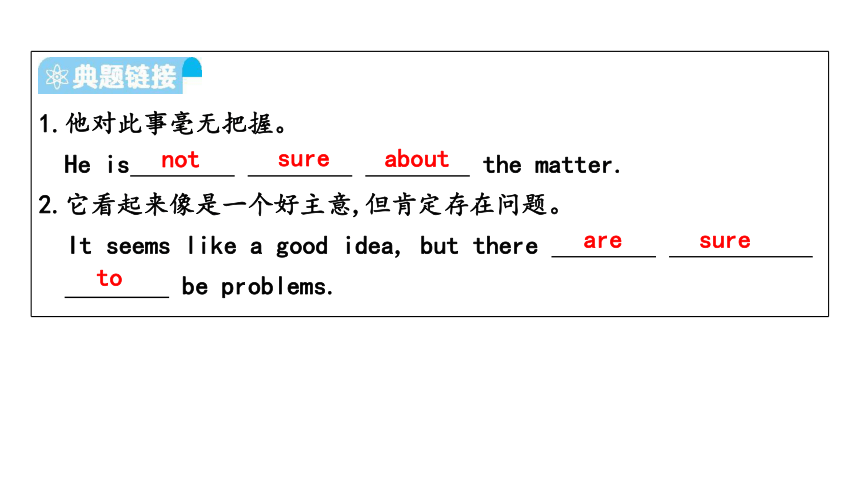
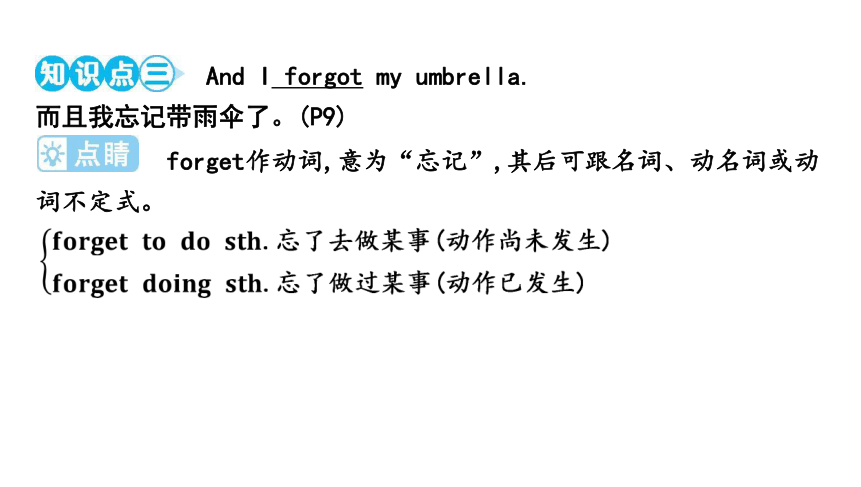
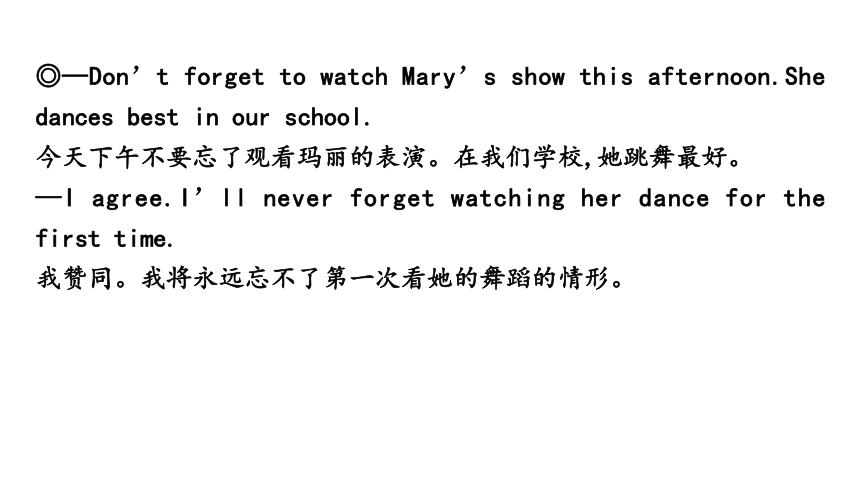
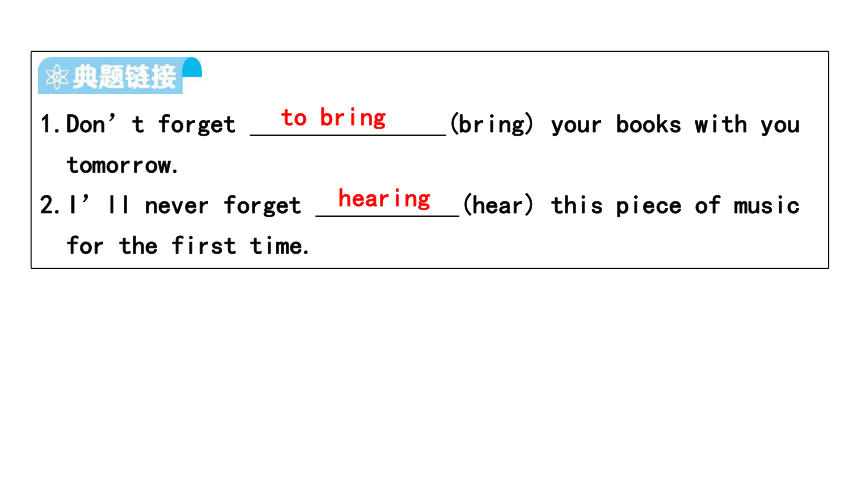
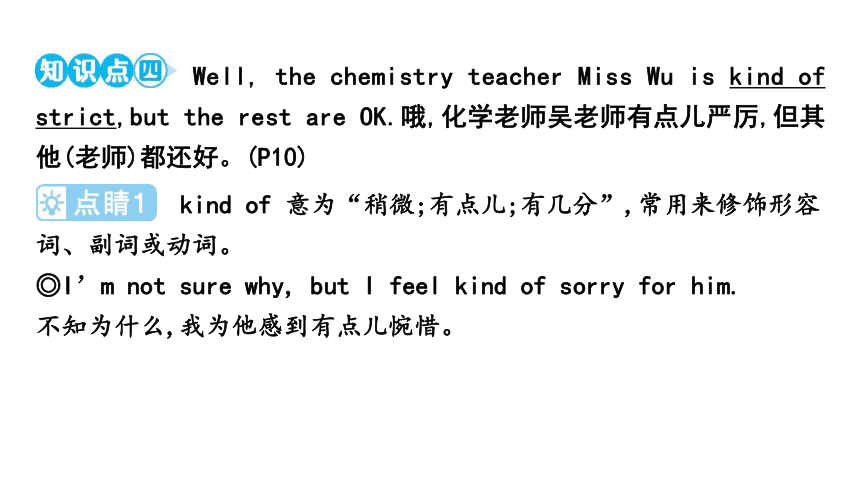
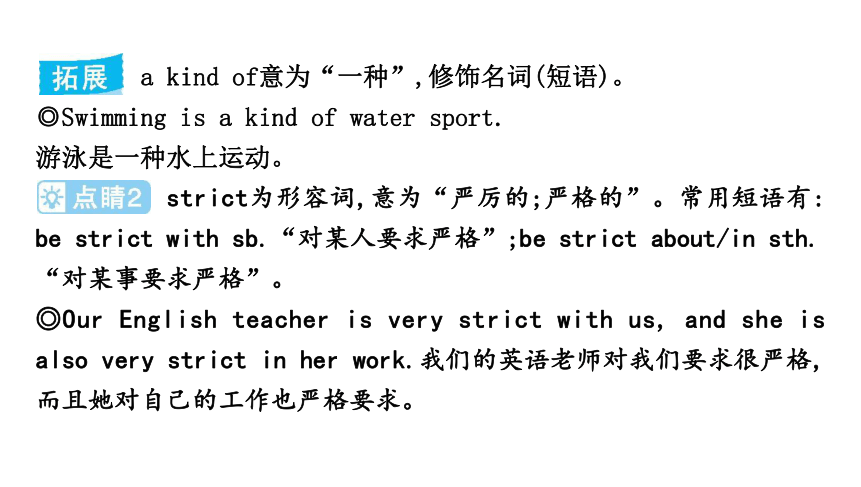
文档简介
(共33张PPT)
Unit 2 It’s a nice day, isn’t it
Section A
He’s really good,isn’t he
他真好,不是吗 (P9)
这是一个反意疑问句。反意疑问句是由“陈述句+ 附加疑问部分”构成,用以要求对方证实所述之事。反意疑问句前后两部分必须遵循的原则是“三同一反”,即:人称相同,动词相同,时态相同,前肯后否,前否后肯。
◎That was a long time ago, wasn’t it
那是好久以前的事了,是吗
◎You’re not busy doing anything, are you
你没有忙于做任何事,是吗
陈述句带有never,nothing,hardly,few,little等否定或半否定词时,附加疑问部分一般用肯定式。如:
◎She has few friends here,does she
她在这里几乎没有朋友,是吗
1.你从未见过他,对吗
You never saw him,
2.今天早上有点冷的,是不是
It’s a little cold this morning,
did
you
isn’t
it
He sure is!他的确如此!(P9)
sure为副词,意为“确实;的确”,用以加强语气。
◎He sure looked unhappy.他的确看上去不高兴。
(1)sure作副词,还有“当然”之意,表示赞同。作答语用时,相当于of course或certainly。
◎—Can you open the window, please
请问你能打开窗户吗
—Sure./Of course./Certainly.当然可以。
(2)sure还可作形容词,意为“确信;肯定;有把握”,常用搭配有:
◎We’re sure of/about the answer.
我们确信答案(是正确的)。
◎The show is sure to be popular.
这个节目必定受欢迎。
◎I’m sure that I can pass the exam.
我确信我能通过考试。
1.他对此事毫无把握。
He is the matter.
2.它看起来像是一个好主意,但肯定存在问题。
It seems like a good idea, but there .
be problems.
not
sure
about
are
sure
to
And I forgot my umbrella.
而且我忘记带雨伞了。(P9)
forget作动词,意为“忘记”,其后可跟名词、动名词或动词不定式。
◎—Don’t forget to watch Mary’s show this afternoon.She dances best in our school.
今天下午不要忘了观看玛丽的表演。在我们学校,她跳舞最好。
—I agree.I’ll never forget watching her dance for the first time.
我赞同。我将永远忘不了第一次看她的舞蹈的情形。
1.Don’t forget (bring) your books with you
tomorrow.
2.I’ll never forget (hear) this piece of music
for the first time.
to bring
hearing
Well, the chemistry teacher Miss Wu is kind of strict,but the rest are OK.哦,化学老师吴老师有点儿严厉,但其他(老师)都还好。(P10)
kind of 意为“稍微;有点儿;有几分”,常用来修饰形容词、副词或动词。
◎I’m not sure why, but I feel kind of sorry for him.
不知为什么,我为他感到有点儿惋惜。
a kind of意为“一种”,修饰名词(短语)。
◎Swimming is a kind of water sport.
游泳是一种水上运动。
strict为形容词,意为“严厉的;严格的”。常用短语有: be strict with sb.“对某人要求严格”;be strict about/in sth. “对某事要求严格”。
◎Our English teacher is very strict with us, and she is also very strict in her work.我们的英语老师对我们要求很严格,而且她对自己的工作也严格要求。
1.那使我感到有点儿尴尬。
2.我父母对我的学习要求很严格。
3.他爱他的学生,并且他对他们要求很严格。
That made me kind of embarrassed.
My parents are very strict in my study.
He loves his students,and he is strict with them.
It’s natural to feel unsure of ourselves when starting conversations with strangers.
当与陌生人开始交谈时我们自己觉得没有把握是很正常的。(P11)
It’s natural to do sth.为“It’s+adj.+to do sth.”结构,意为“做某事是自然的/正常的”。natural意为“自然的;天然的;正常的”,其名词形式为nature“自然;自然界”。
◎It’s natural for us to love nature.
我们热爱大自然是常情。
unsure作形容词,意为“无把握;不确知”。un-为否定前缀。
◎If you are unsure about anything, just ask.
如果你有什么不确定的,就问。
conversation作名词,意为“交谈;谈话”。常见的短语 有:have/hold a conversation with sb.(与某人交谈); make conversation with sb.(与某人找话说)。
◎They had a short conversation in German.
他们用德语进行简短的交谈。
stranger作名词,意为“陌生人”,其形容词形式为strange,意为“陌生的;奇怪的”。
◎It’s really strange that he is afraid to speak to strangers.真的很奇怪,他不敢和陌生人说话。
1.It’s (nature) for parents to worry about their
children.
2.Tom has told his daughter not to speak to .
(strange).
3.昨天我与她进行了一次长谈。
I had a long her yesterday.
natural
strangers
conversation
with
What does the writer suggest for Ben’s situation
对于本的处境,作者建议什么 (P11)
suggest作及物动词,意为“建议; 提议”,后面接名词、代词、动名词或that引导的宾语从句。
◎He suggested a walk.他提议散散步。
◎Most doctors suggest drinking lots of fresh fruit juice and water to avoid flu.大多数医生建议喝许多新鲜的果汁和水来避免(患)流感。
◎He suggested (that) we (should) do it at once.
他建议我们立刻做这件事。
suggestion为名词,意为“建议; 提议”。
◎May I make a suggestion 我可以提个建议吗
1.Joan suggested (ask) her father for his opinion.
2.It was time to put their (suggest) into
practice.
asking
suggestions
Section B
It was really exciting, wasn’t it
它真令人兴奋,不是吗 (P13)
exciting作形容词,意为“令人兴奋的;使人激动的”。如: exciting news(令人振奋的消息);an exciting film(一部激动人心的电影)。
[辨析]exciting与excited
exciting 意为“令人兴奋的”,可作定语和表语,作表语时主语通常是物
excited 意为“兴奋的;激动的”,常作表语,其主语通常是人
◎The story is exciting.这个故事振奋人心。
◎Everyone looked excited.人人都看上去很兴奋。
1.The kids were (excite) about the holiday.
2.The film is very (excite) and I want to watch
it again.
excited
exciting
Though the things we talk about are not usually important, small talk itself is.
尽管我们谈论的事通常不重要,闲聊本身却很重要。(P14)
though意为“虽然; 尽管”,引导让步状语从句。注意though作从属连词时,不能与并列连词but连用,但可以与yet连用。
◎Though she tried very hard, she failed the examination.
虽然她很刻苦,但考试没有及格。
◎Though modesty is a virtue,yet shyness is a vice.
尽管谦虚是一种美德,但害羞就成了缺点。
though还可作副词,意为“可是;然而”。口语中常用于句末,前面通常用逗号隔开。
◎I have a bit of cold.It’s nothing serious, though.
我有点儿感冒。不过并不严重。
talk about意为“谈论;谈及”。talk常见的短语还有: talk back(回嘴,顶嘴); talk into(说服); talk over(商量;讨论)。
◎English people love to talk about the weather.
英格兰人喜欢谈论天气。
◎You shouldn’t talk back to your grandmother.
你不该跟你奶奶顶嘴。
1.他虽然很年轻,却是最出色的老师。
He’s the best teacher, he is very young.
2.如果你不介意的话,我们将不再谈论这件事情了。
If you don’t mind, we won’t it any more.
3.小孩子不应该跟父母顶嘴。
Little children should not to their
parents.
though
talk
about
talk
back
4.然而,旧的习惯可能很难被戒除。
Old habits may be hard to kick, .
though
However, many Western people think these are private subjects, so they should be avoided.然而,很多西方国家的人认为这些是私人话题,因此它们应当被避免。(P14)
however作副词,意为“然而”。可用于句首、句中或句尾,须用逗号与其他内容隔开。
◎My father,however,did not agree.
然而,我父亲不同意。
private作形容词,意为“私人的;私密的”。其反义词为public(公共的;公开的)。常用短语in private “私下里;秘密地”。
◎Could I speak to you in private
我能否私下跟您谈谈
avoid作动词,意为“避免;回避”。其后可接名词或代词作宾语,也可接动词-ing形式作宾语,但是不能接不定式。
◎Fire is serious in this area.We should avoid it.
这个地区火灾严重。我们应当避开它。
◎He avoided answering my question.
他避而不答我的问题。
1.我的房间很小。然而,它很舒服。
My room is small. , it’s comfortable.
2.我们应避免犯错误。
We shall mistakes.
3.我认为我将和这位男士私下谈一谈。
I think I’ll have a word with the man .
However
avoid
making
in
private
Unit 2 It’s a nice day, isn’t it
Section A
He’s really good,isn’t he
他真好,不是吗 (P9)
这是一个反意疑问句。反意疑问句是由“陈述句+ 附加疑问部分”构成,用以要求对方证实所述之事。反意疑问句前后两部分必须遵循的原则是“三同一反”,即:人称相同,动词相同,时态相同,前肯后否,前否后肯。
◎That was a long time ago, wasn’t it
那是好久以前的事了,是吗
◎You’re not busy doing anything, are you
你没有忙于做任何事,是吗
陈述句带有never,nothing,hardly,few,little等否定或半否定词时,附加疑问部分一般用肯定式。如:
◎She has few friends here,does she
她在这里几乎没有朋友,是吗
1.你从未见过他,对吗
You never saw him,
2.今天早上有点冷的,是不是
It’s a little cold this morning,
did
you
isn’t
it
He sure is!他的确如此!(P9)
sure为副词,意为“确实;的确”,用以加强语气。
◎He sure looked unhappy.他的确看上去不高兴。
(1)sure作副词,还有“当然”之意,表示赞同。作答语用时,相当于of course或certainly。
◎—Can you open the window, please
请问你能打开窗户吗
—Sure./Of course./Certainly.当然可以。
(2)sure还可作形容词,意为“确信;肯定;有把握”,常用搭配有:
◎We’re sure of/about the answer.
我们确信答案(是正确的)。
◎The show is sure to be popular.
这个节目必定受欢迎。
◎I’m sure that I can pass the exam.
我确信我能通过考试。
1.他对此事毫无把握。
He is the matter.
2.它看起来像是一个好主意,但肯定存在问题。
It seems like a good idea, but there .
be problems.
not
sure
about
are
sure
to
And I forgot my umbrella.
而且我忘记带雨伞了。(P9)
forget作动词,意为“忘记”,其后可跟名词、动名词或动词不定式。
◎—Don’t forget to watch Mary’s show this afternoon.She dances best in our school.
今天下午不要忘了观看玛丽的表演。在我们学校,她跳舞最好。
—I agree.I’ll never forget watching her dance for the first time.
我赞同。我将永远忘不了第一次看她的舞蹈的情形。
1.Don’t forget (bring) your books with you
tomorrow.
2.I’ll never forget (hear) this piece of music
for the first time.
to bring
hearing
Well, the chemistry teacher Miss Wu is kind of strict,but the rest are OK.哦,化学老师吴老师有点儿严厉,但其他(老师)都还好。(P10)
kind of 意为“稍微;有点儿;有几分”,常用来修饰形容词、副词或动词。
◎I’m not sure why, but I feel kind of sorry for him.
不知为什么,我为他感到有点儿惋惜。
a kind of意为“一种”,修饰名词(短语)。
◎Swimming is a kind of water sport.
游泳是一种水上运动。
strict为形容词,意为“严厉的;严格的”。常用短语有: be strict with sb.“对某人要求严格”;be strict about/in sth. “对某事要求严格”。
◎Our English teacher is very strict with us, and she is also very strict in her work.我们的英语老师对我们要求很严格,而且她对自己的工作也严格要求。
1.那使我感到有点儿尴尬。
2.我父母对我的学习要求很严格。
3.他爱他的学生,并且他对他们要求很严格。
That made me kind of embarrassed.
My parents are very strict in my study.
He loves his students,and he is strict with them.
It’s natural to feel unsure of ourselves when starting conversations with strangers.
当与陌生人开始交谈时我们自己觉得没有把握是很正常的。(P11)
It’s natural to do sth.为“It’s+adj.+to do sth.”结构,意为“做某事是自然的/正常的”。natural意为“自然的;天然的;正常的”,其名词形式为nature“自然;自然界”。
◎It’s natural for us to love nature.
我们热爱大自然是常情。
unsure作形容词,意为“无把握;不确知”。un-为否定前缀。
◎If you are unsure about anything, just ask.
如果你有什么不确定的,就问。
conversation作名词,意为“交谈;谈话”。常见的短语 有:have/hold a conversation with sb.(与某人交谈); make conversation with sb.(与某人找话说)。
◎They had a short conversation in German.
他们用德语进行简短的交谈。
stranger作名词,意为“陌生人”,其形容词形式为strange,意为“陌生的;奇怪的”。
◎It’s really strange that he is afraid to speak to strangers.真的很奇怪,他不敢和陌生人说话。
1.It’s (nature) for parents to worry about their
children.
2.Tom has told his daughter not to speak to .
(strange).
3.昨天我与她进行了一次长谈。
I had a long her yesterday.
natural
strangers
conversation
with
What does the writer suggest for Ben’s situation
对于本的处境,作者建议什么 (P11)
suggest作及物动词,意为“建议; 提议”,后面接名词、代词、动名词或that引导的宾语从句。
◎He suggested a walk.他提议散散步。
◎Most doctors suggest drinking lots of fresh fruit juice and water to avoid flu.大多数医生建议喝许多新鲜的果汁和水来避免(患)流感。
◎He suggested (that) we (should) do it at once.
他建议我们立刻做这件事。
suggestion为名词,意为“建议; 提议”。
◎May I make a suggestion 我可以提个建议吗
1.Joan suggested (ask) her father for his opinion.
2.It was time to put their (suggest) into
practice.
asking
suggestions
Section B
It was really exciting, wasn’t it
它真令人兴奋,不是吗 (P13)
exciting作形容词,意为“令人兴奋的;使人激动的”。如: exciting news(令人振奋的消息);an exciting film(一部激动人心的电影)。
[辨析]exciting与excited
exciting 意为“令人兴奋的”,可作定语和表语,作表语时主语通常是物
excited 意为“兴奋的;激动的”,常作表语,其主语通常是人
◎The story is exciting.这个故事振奋人心。
◎Everyone looked excited.人人都看上去很兴奋。
1.The kids were (excite) about the holiday.
2.The film is very (excite) and I want to watch
it again.
excited
exciting
Though the things we talk about are not usually important, small talk itself is.
尽管我们谈论的事通常不重要,闲聊本身却很重要。(P14)
though意为“虽然; 尽管”,引导让步状语从句。注意though作从属连词时,不能与并列连词but连用,但可以与yet连用。
◎Though she tried very hard, she failed the examination.
虽然她很刻苦,但考试没有及格。
◎Though modesty is a virtue,yet shyness is a vice.
尽管谦虚是一种美德,但害羞就成了缺点。
though还可作副词,意为“可是;然而”。口语中常用于句末,前面通常用逗号隔开。
◎I have a bit of cold.It’s nothing serious, though.
我有点儿感冒。不过并不严重。
talk about意为“谈论;谈及”。talk常见的短语还有: talk back(回嘴,顶嘴); talk into(说服); talk over(商量;讨论)。
◎English people love to talk about the weather.
英格兰人喜欢谈论天气。
◎You shouldn’t talk back to your grandmother.
你不该跟你奶奶顶嘴。
1.他虽然很年轻,却是最出色的老师。
He’s the best teacher, he is very young.
2.如果你不介意的话,我们将不再谈论这件事情了。
If you don’t mind, we won’t it any more.
3.小孩子不应该跟父母顶嘴。
Little children should not to their
parents.
though
talk
about
talk
back
4.然而,旧的习惯可能很难被戒除。
Old habits may be hard to kick, .
though
However, many Western people think these are private subjects, so they should be avoided.然而,很多西方国家的人认为这些是私人话题,因此它们应当被避免。(P14)
however作副词,意为“然而”。可用于句首、句中或句尾,须用逗号与其他内容隔开。
◎My father,however,did not agree.
然而,我父亲不同意。
private作形容词,意为“私人的;私密的”。其反义词为public(公共的;公开的)。常用短语in private “私下里;秘密地”。
◎Could I speak to you in private
我能否私下跟您谈谈
avoid作动词,意为“避免;回避”。其后可接名词或代词作宾语,也可接动词-ing形式作宾语,但是不能接不定式。
◎Fire is serious in this area.We should avoid it.
这个地区火灾严重。我们应当避开它。
◎He avoided answering my question.
他避而不答我的问题。
1.我的房间很小。然而,它很舒服。
My room is small. , it’s comfortable.
2.我们应避免犯错误。
We shall mistakes.
3.我认为我将和这位男士私下谈一谈。
I think I’ll have a word with the man .
However
avoid
making
in
private
同课章节目录
- Unit 1 When was heborn?
- Section A
- Section B
- Unit 2 It's a nice day, isn't it?
- Section A
- Section B
- Unit 3 Where would you like to visit?
- Section A
- Section B
- Unit 4 How can we become good learners?
- Section A
- Section B
- Unit 5 I think that mooncakes are delicious!
- Section A
- Section B
- Unit 6 Could you please tell me where the restroom
- Section A
- Section B
- Unit 7 I used to be afraid of the dark.
- Section A
- Section B
- Unit 8 What are the shirts made of?
- Section A
- Section B
